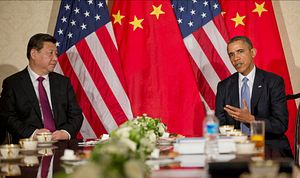I spent a week in China early this month on the heels of the Shangri-La Dialogue and amidst rising tensions in the South China Sea following China’s placement of an oil rig in disputed waters near Vietnam. Instead of spending time “inside the ring roads” of Beijing with America-handlers practiced at making careful judgments about the China-U.S. relationship, I visited a few regional cities where the Chinese views of the U.S. rebalancing policy that I heard were harsh and unvarnished. This mood parallels Liz Economy’s assessment last month of the growing misconnect in U.S.-China relations.
At an academic workshop, I listened to a presentation by a Chinese colleague on how the U.S. grand strategy of the rebalance, and especially American efforts to reassure allies, were really about the “construction of threats,” designed to make China into the enemy. In this scholar’s narrative, the Obama administration’s “Return to Asia” was responsible for promoting regional instability, especially by backing allies, thereby creating instability and a demand among allies for greater security measures. President Obama’s promise in April to defend the Senkakus was a primary case in point. The economic component of the U.S. rebalancing strategy through establishment of the Trans-Pacific Partnership (TPP) drew an equally skeptical analysis from this scholar, who concluded that the U.S. design is to create an unstable atmosphere in Asia so that Asian countries continue to accept a U.S. presence in the region.
I found that hearing this presentation was useful preparation for a set of questions I received in advance of an interview with a Chinese provincial television station. A number of the questions I was asked provide insights on what the Chinese public may be hearing—either as a result of intentional or accidental distortion—when the United States talks about the rebalance to Asia.
- What kind of equilibrium situation would the U.S. want to achieve though its rebalancing to Asia and Pacific? Which nations’ engaging power does the U.S. want to balance?
- We never heard of any Chinese experts talking about any balancing strategy to North America, to keep the needed equilibrium among Canada, America, and Mexico. Why is the U.S. dominance in the North America accepted by China like this, while China’s strength advantage in Asia cannot be accepted by the U.S.? Why does the U.S. regard China’s regional upper hand as something needing to be balanced?
- What does the U.S. think about the Japanese military force development in its strategy of rebalancing Asia and Pacific? Does America consider the Chinese public’s worry about Japan strengthening its self-defense forces?
- Most of the Chinese public dislike so many American military bases existing close to their nation. They think that the Untied States never allows its rivals’ military bases—such as Cuba’s—near its territory but puts so many bases around China. What do you think about these perspectives?
Despite the manifest weaknesses of the “pivot” terminology that drove the administration to adopt the term “rebalance” to Asia, these questions from Chinese colleagues suggest that the term “rebalance” also has its shortcomings, especially given its propensity to be misinterpreted as referring to realist international relations theory concepts surrounding “balancing.” As the questions above reveal, many Chinese can easily interpret this “rebalancing” as a form of U.S. containment.
But my more lasting impression from this trip to China is that the broader Chinese psychology associated with its rise has moved well past Hu Jintao’s focus on “peaceful development” to a mindset in which, as part of Xi Jinping’s “Chinese dream,” China’s ability to exert its own sphere of influence in Asia is regarded as an expected benefit that will naturally accrue, regardless of the impact on the neighborhood. And this is why, regardless of what it is called, the United States must make the task of preserving East Asian stability a top priority not only for the Obama administration, but also for the long-term.
Scott A. Snyder is senior fellow for Korea studies and director of the program on U.S.-Korea policy at the Council on Foreign Relations. He was previously a senior associate in the international relations program of The Asia Foundation and Pacific Forum CSIS. He blogs at Asia Unbound, where this piece originally appeared.

































